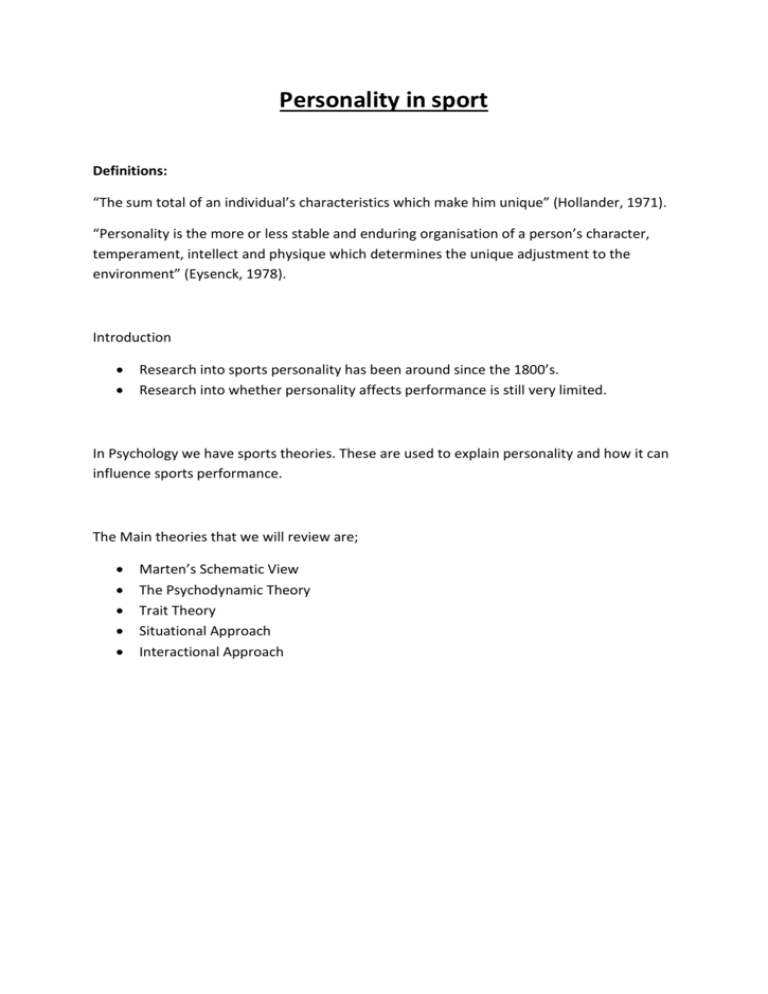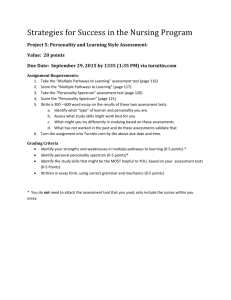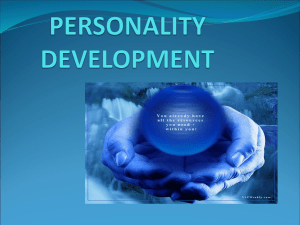Personality in Sport: Theories & Impact
advertisement

Personality in sport Definitions: “The sum total of an individual’s characteristics which make him unique” (Hollander, 1971). “Personality is the more or less stable and enduring organisation of a person’s character, temperament, intellect and physique which determines the unique adjustment to the environment” (Eysenck, 1978). Introduction Research into sports personality has been around since the 1800’s. Research into whether personality affects performance is still very limited. In Psychology we have sports theories. These are used to explain personality and how it can influence sports performance. The Main theories that we will review are; Marten’s Schematic View The Psychodynamic Theory Trait Theory Situational Approach Interactional Approach Martens Schematic View It is in the opinion of Marten’s that we have 3 different levels 1. Psychological Core 2. Typical Responses 3. Role related behaviour Space for diagram The psychological core Referred to as the real you Part of you that contains your beliefs, values, attitudes and interests Relatively constant and stable responses Example: In this instance your decisions are usually the same even in different environments. 1. You are in an exam where you know a lot of your college mates are cheating. You don’t do this because it would be wrong. 2. You are a professional athlete and see how a lot of your team mates are taking performance enhancing drugs to improve their performance. You do not do this as you see this as cheating. Your beliefs are stable in that you believe both instances are cheating. Typical Responses The usual ways that you respond to the world around you, or different situations you may find yourself in. Example: On a Saturday afternoon you play 5 a side football. The opposition you are playing keep intentionally fouling you. This results on you getting pent up resulting in you shouting and becoming aggressive as you believe this behaviour deliberate and unsporting. On the other hand one evening you may be introduced to someone new and you may be quiet when you meet this person for the time because you don’t want to overawe them. The responses you provide during these two instances is referred to how you personality changes when it is placed in different situations......typical responses! Role Related Behaviour This is determined by the circumstances you find yourself in This is the most changeable aspect of personality, as your personality changes as the perception of your personality changes. Example: Around lively loud people you may act loud also to fit in. Around quiet, shy people you may act more reserved not to overwhelm them. The Trait Theory The trait theories propose that everyone has certain characteristics which will determine partly how they behave in certain situations. Traits are relatively stable (don’t change) It is believed there are 2 main dimensions to personality: 1. An introversion-extroversion dimension 2. A stable-neurotic dimension. Introverts People who do not actively seek excitement and would rather be in calm environments. They prefer tasks that require concentration and dislike the unexpected. Extroverts Become bored quickly Not generally good at tasks that require concentration They seek change and excitement. Individual task What are you, an introvert or extrovert? Complete personality test to reveal you results. Class Discussion In a sporting situation, who do you belief would be better an introvert of an extrovert? It is proposed.... Extroverts are less responsive to pain making them better in physical tasks/sports. Extroverts are said to be more successful in sporting situations because they can cope with competitive and distracting situations. It is said a person’s personality can be classed as either stable or unstable. Stable individuals tend to be more easy going and even tempered. Unstable people tend to be restless, excitable, and have tendency to become anxious and more highly aroused. Do you think you are stable or unstable (neurotic)? Pair Discussion Eysenck and Cattell (1941) propose traits are mainly inherited- do you think you have the same characteristics of personality as your parents? In conclusion of the trait theory.... Trait theories are too simplistic as personality alone cannot predict success in sport. For instance just because your introvert, does that mean you cannot be good at a physical sport? It can be used to explain why people act certain ways, and why some people play team/ individual sports. Social Learning Theory This theory was produced by Bandura (1977) Suggests personality is not stable characteristic, but constantly changes as a result of the environment we are in. It suggests it is unlikely person will behave in the same way in different situations. The theory typical proposes that people learning sporting situations through two processes: 1. Modelling 2. Reinforcement Modelling- individuals model themselves on people they can relate too, such as professionals who play he same sport. As behaviour of that professional is observed, they attempt to copy it. Reinforcement- this is important because if an individual’s behaviour in reinforced or rewarded in some way it is likely that that behaviour is repeated. E.g. gold stars for children who try hard in a sport Questions 1. Do you believe behaviour is learnt? 2. How can performance reinforcement in sport? Bandura (1977) identified 4 main stages of observational learning that he believes demonstrates How modelling influences personality and behaviour. 1. Attention- learn through observation 2. Retention- for modelling to be successful, observed skill must be retained in the memory to recall it when needed. 3. Motor production- must be able to physically perform a task he/she is doing. More the skill is practiced the more learnt the skill will become. 4. Motivational response- unless the athlete is motivated, he/she will not go through the previous 3 stages of modelling. Situational approach Says behaviour is dependent on your situation or environment It argues that this is more important than traits There is only a small amount of support for this theory. It is said that as individuals may be introverted (e.g. they display characterises such as tolerance and shyness) but may participate in more extraverted sports such as rugby where characteristics such as aggression are needed. The Interactional Theory This theory is the most widely excepted by sports psychologists in explaining a person’s behaviour/personality. It is said, in order to predict behaviour in a sporting setting you need to consider how the situation and personality traits link and work together. The theory suggests that when situational factors are particular strong (e.g. during a sporting example such as a penalty shoot out), they are most likely to predict behaviour than personality traits. The person maybe a quiet and shy person (introvert for example) but because he has scored the winning penalty in a final, he reacts loud, screaming and celebrating. Personality Types Another way in which psychologists have studied the relationship between personality and sporting performance is by grouping personality traits under 2 headings similar to that of introvert and extrovert. Type A They tend to lack patience Have a strong urge to compete A high desire to achieve goals Always rush to complete activities Will happily multi task when under pressure Lack tolerance towards others Experience higher levels of anxiety Type B More tolerant towards people Relaxed Experience lower levels of anxiety Display higher levels of imagination Display higher levels of creativity Questions What personality type do you thin you are? Do you think its possible to e both? Is it possible to change time, as you get older? The effects of personality of sports performance There is NO direct link between personality and sporting performance Research has pointed out that some personality types may be more benefited by a specific personality. There is however little to say that your personality will make you a better or worse athlete. Athlete’s vs. non athletes Research suggests no universal athletic personality However, findings have suggested athletes whom take part in team sports tend to be more extroverted. Research in this area suggests the sport the athlete plays is more likely to relate to their personality. Individual vs. team athletes It has been found that team athletes are more likely to be extroverted, more anxious, and less imaginative. It has also been found that individual athletes are more likely to have higher levels of objectivity, more dependant, less anxious, and imaginative. Males vs. females Woman have been found to be more introvert (in a sporting context) Elite vs. Non Elite Research of the past 100 years suggests that successful athletes display low levels of depression, fatigue, confusion and anger. This research was however only done on small populations, making results unclear. Resent research suggests personality accounts for less than 1% of performance success. Type A Vs Type B Research in psychology has found that a person with Type A personality is more likely to be successful in sport than Type B. Furthermore, it has been found a Type A personality is likely to persist in learning a skill for longer and is likely to be a lot more motivated to compete. Further Research finding... Weinberg and Gould (1995) suggest that personality traits and states can help predict sports behaviour and success, but are not precise. For example, just because one gold winning runner has an introverted personality, doesn’t mean every gold winning runner has to have an introverted personality. Schurr, Ashley and Joy (1997) did a research study on 2000 males. The results obtained through their study suggested no direct personality factor between athletes and non athletes. Question Can you pick a team just basing your squad of personality???? Morgan (1979) evaluated 16 candidates for an American rowing team he predicted 10 of the 16 finalists using the mental health model. This could therefore suggest that personality factors are associated with success in sport However, other psychologists have an opinionated view to this technique saying Morgan had only picked 10 correct of the 16, therefore many great players would have been left out using his technique Analysis of many theories suggests that there is no clear association between personality and success in sport http://www.youtube.com/watch?v=u-WmfTIRUWY http://www.youtube.com/watch?v=66ZikFp4o9Y&feature=related http://www.youtube.com/watch?v=vdh7MngntnI http://www.youtube.com/watch?v=ZeE_Ymzc1rE&feature=related









